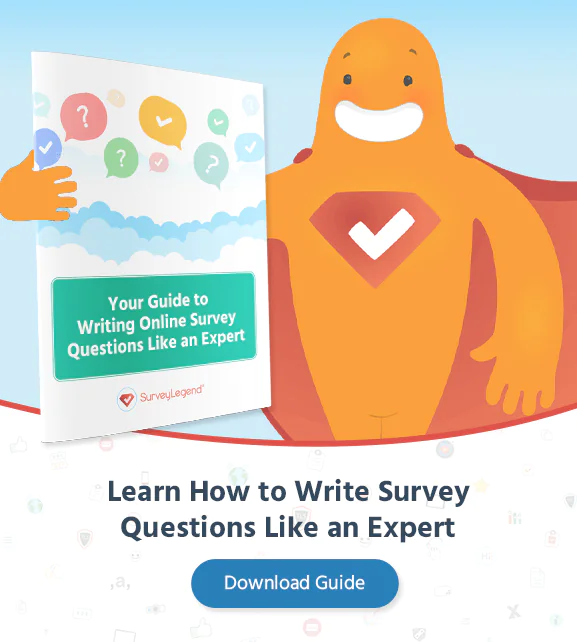As the threat of COVID-19 and its variants linger, discussions abound around the topics of masks and vaccinations. While different countries are instituting different rules and regulations surrounding wearing masks and vaccine mandates, there is one commonality: not everyone will agree on any one solution. Of course, some of the most raging debates surrounding mask and/or vaccination mandates are happening in the workplace and at schools throughout the United States. This has led to the need for mask and vaccination surveys, which we’ll discuss in a bit.
Create your mask or vaccination survey, poll, or questionnaire now!
Employers & Employees: Mask and Vaccination Mandates
According to an American Staffing Association survey, nearly 60% of adults say employees should be required to wear a mask when working even if they’ve been vaccinated. Another 66% of respondents say they have a “right to know” if their co-workers have the vaccine. The survey also revealed both racial/ethnic and generational differences when it came to mask and vaccination opinions. Black and Hispanic workers were more likely to agree with on-site masking even after vaccination (At 70% and 64%, respectively) compared with 50% of white workers. Baby Boomers and the Silent Generation were more likely to say workers had a right to know their co-workers’ vaccination statuses, while Generation X, Millennials, and Zoomers were more likely to say vaccination status should be private.
“While government officials are rolling back COVID-19 requirements throughout the country, many workers aren’t ready to give up their masks just yet,” said Richard Wahlquist, president of the American Staffing Association. “Employers must clearly communicate what steps they are taking to make their workplaces safe for their employees as they reopen.”
In response to this, many employers plan to institute mask and vaccine mandates in the coming months. Willis Towers Watson recently took a survey of attitudes toward vaccination among employers, which revealed that more than half of employers expect to have workplace vaccine mandate requirements in the fourth quarter, a dramatic increase from the current 21%.
Major companies have already instituted vaccination requirements for certain employees (Citigroup, Deloitte, McDonald’s, Microsoft, Tyson, Walmart) while others are pushing back their “return to office” date for everyone or specifically non-vaccinated employees (Facebook, New York Times, Salesforce, Twitter). Others have recently been announcing vaccination requirements to happen in the fourth quarter (Amtrak, CVS, Netflix, United Airlines). For a rundown on requirements, check out NBC News.
Students & Educators: Mask and Vaccination Mandates
The CDC has recommended universal mask-wearing for teachers and students inside school buildings this fall, citing the rapid spread of the delta variant. A majority of Americans (6 in 10) say they support mask mandates for students and teachers in K-12 schools, according to an Associated Press survey. Many also believe teachers and eligible students should be required to receive a COVID-19 vaccine.
Unsurprisingly, the big divide is along political lines. 3 in 10 Republicans said they favor mask requirements for students and teachers, compared with 8 in 10 Democrats. There was a similar split over vaccine mandates in schools. As a result, requirements vary from state to state. While many states allow school districts to set their own mask policies, Democratic-led states such as California, Illinois, and Louisiana require masks for students and teachers statewide. Meanwhile, Republican-led states, such as Texas, Florida, and Tennessee, have moved to ban universal mask mandates in schools. Republican governors banning mask mandates have even been threatened with legal action by President Joe Biden.
“I understand personal choice, I understand personal freedom. But when it comes to public health, we should all be looking out for each other,” says Budhiono Riyanto, 37, of Queens, New York. “The best protection so far is to mask up and vaccinate.”
Mask and Vaccination Survey Considerations
Because of the sharply divided beliefs around masks requirements and vaccination mandates, you’ll want to be careful when surveying employees, students, educators, and parents. In addition, survey questions relating to COVID-19 vaccination status or someone’s intention to vaccinate can be highly controversial. It is possible that asking these questions may result in negative feedback from respondents or low levels of participation in the survey. So, here are some considerations for your mask and vaccination surveys. (Be sure to check out our blog on How to Ask Sensitive Questions).
1. Emphasize the Importance of the Survey
Too often, people aren’t told why they’re being asked to participate in a survey or how it will benefit them. To help ensure participation and honestly, be upfront about the reason for the survey and why respondents should care about it. For example, let them know that their responses may influence your policies on masks and vaccination mandates.
2. Use Anonymous Online Surveys
Because of the controversy surrounding masks and vaccines, you’ll want to conduct your survey online – and you’ll want to make it anonymous. This provides a sense of security, resulting in people giving their true thoughts and feelings. For web surveys to be anonymous, you’ll forgo asking a person for their name, reconsider questions that could “give someone away” (this is especially true in small sample surveys), and use encryption to block respondents’ IP addresses or email addresses.
3. Make Questions Optional
In order to minimize any potential legal risk, and to increase response rates, make the survey optional. Also, be sure to make any survey question optional as well. In doing so, you may be able to collect enough information to make an informed decision, but you’ve allowed respondents to skip certain questions they may feel uncomfortable with.
4. Avoid Leading Questions
Leading mask and vaccination survey questions intentionally or unintentionally persuade a participant to one side or conclusion. In the example below, the wording of the leading question may pre-condition the participant to think of masking as a good safety measure:
- Leading: How safe do you feel when others wear a mask?
- Non-Leading: Do you feel safe when others wear a mask?
5. Understand Social Desirability Bias
Our ideas about what others think of us hinge on what psychologists call our self-concept—our own beliefs about who we are. This means that we often present our actions and words in a way that makes us look good to others, even though they may be inaccurate. For example, an employee in a very liberal company may know that most of their co-workers support vaccinations, and so they may say they are vaccinated when they really are not. One way to get the truth is to ask what appears to be redundant questions, just slightly modifying the question and response. If the answer to both vary greatly, you may have a dishonest respondent.
6. Avoid Absolute Questions
Otherwise known as the “yes or no” vaccination survey questions. For example, if you ask, “Would you get vaccinated if we required it?” you’re backing respondents into a corner because they don’t know if there are other options. For example, could they stay unvaccinated but work from home? Could they submit to weekly COVID-19 tests instead? Always be sure to provide options and be clear.
7. Consider Legal Advice
If you’re going to be asking directly if a respondent has been vaccinated, even in an anonymous survey, it’s strongly recommended that you seek legal advice before launching your COVID-19 survey (especially a child vaccination survey). Certain legislation or regulatory requirements exist around the collection of medical information. So, you want to be sure you’re within your legal rights and not violating the rights of respondents.
Conclusion
Mask requirements and vaccination mandates remain a hotly debated topic across the country and the world. As a result, many employers and school districts may be considering a mask and vaccination survey. They use these to find out just what the majority of employees, students, parents, or educators feel on the topic in order to create policies around them. However, because of the divided opinions, it’s important to take into consideration our seven survey tips. You might also be interested in these COVID survey-related blogs:
- 15 Student Survey Questions to Ask About COVID
- How to Create a COVID-19 Work From Home Survey
- 25 Employee Survey Questions: COVID Return-to-Work Guidelines
Ready to begin your mask or vaccination survey? SurveyLegend is here for you with pre-designed, responsive, and highly secure online surveys. Start today for free!
Have you sent out a mask or vaccination in your workplace or school? How were the response rates? Did the responses influence your policies? Sound off in the comments!
Create your mask or vaccination survey, poll, or questionnaire now!
Frequently Asked Questions (FAQs)
Nearly 60% of American adults believe employees should be required to wear a mask when working.
Baby Boomers and older are more likely to believe workers have a right to know their co-workers’ vaccination status. Generation X, Millennials, and younger are more likely to say vaccination status should be a private matter.
While generally legal, employers and school districts conducting surveys should seek legal advice. In some jurisdictions, collecting medical information can be highly sensitive and potentially result in legal action.





